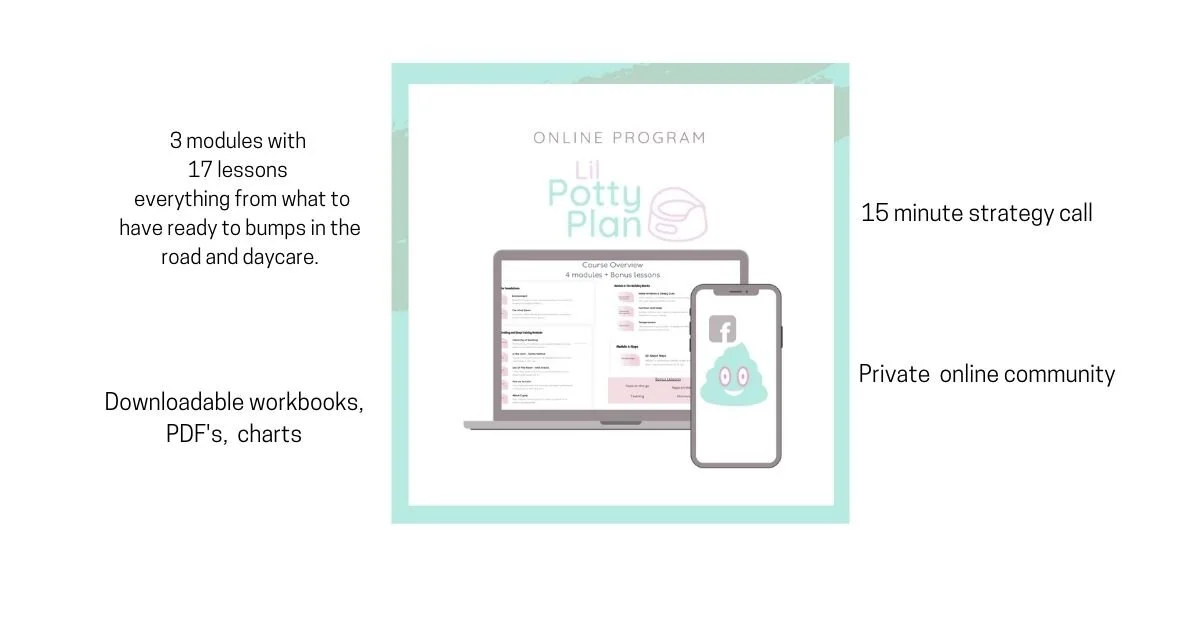Potty Training during the day and Potty Training at night are two completely separate processes. As such we need to fully understand that they will not likely happen at the same time.
Daytime potty training is actively teaching your child the skill of going to the bathroom in a specific place (the potty/toilet). The learning process is essential as they have been in diapers all of their life and until now have not had to connect the urge to go with an actual behaviour and place. We need to show them where to go.
Nighttime potty training is similar however, it’s more reliant on their bodies physical capabilities: the size of their bladder to hold for long periods of time. Physically most children under three do not have a large enough bladder to hold for long periods of time and although having the skill to feel the urge and go at a certain time is essential, developmentally they need to be ready.
This simply means daytime potty training has to be conquered FIRST. Then, when ready they will be able to use these skills at night. Night time potty training is essentially just taking away the diapers.
Guidelines for night time potty training:
Wait until toddler is either waking up dry (you can check 5 minutes before they actually wake up for the day) OR over three years old.
Limit liquids at night. Think triangle, offer lots of liquids in the morning and taper off until after dinner they have been reduced to very little to none.
Make going to the potty a part of your bedtime routine.
Get waterproof pads/mattress protector and have a spare set of PJs beside the bed so cleaning up is easy and FAST. It should be done in the dark.
Offer a “dream pee” - once at night.
Leave a potty beside their bed at first, teach them to go there in the morning when they wake up.
The relationship between night potty training and sleep
At night our brain produces increased levels of a hormone called the “antidiuretic hormone” (ADH). This hormone is responsible for slowing the rate at which our kidneys produce urine at night. This prevents us from waking up at night in the middle of sleep cycles to pee.
So sleep and melatonin production is important to the success of night training. The ADH hormone starts to be produced in higher levels as your child gets older.
How do I know my child is ready to go without diapers at night?
Essentially the answer to this question is when they can hold their bladder/bowels for long periods of time (11-12 hrs). Although, we want to start leading them to practice this after three years old as those muscles need to be exercised or as they get older can cause atrophy and lead to bedwetting.
Does my toddler even need to be night trained?
Technically not until after the age of three years old. There is really no “training” required, however.
I do believe in waiting until they are physically and developmentally ready HOWEVER, some children may need a gentle nudge after three years old. The chances of developing a bedwetting problem are higher if we are not allowing the bladder to practice holding which will in turn cause it to enlarge.
The first thing to master is hands down is daytime toilet training. Once you have a child that is self-initiating, holding it for more than 2 hours at a time, and waking up dry at nap, you can certainly try to remove diapers at night with some of the guidelines mentioned above.
Either way, the word “training” does not accurately depict what is happening here. Your child is learning, growing and we are just directing, showing, and watching to see that it’s time for this big milestone.
Reach out for a step-by-step plan and support all within the full support program - Lil Potty Plan. This way you have a done for you plan and an expert to ask at every step of the way!
Stay dry my friends!
Lil xx


















